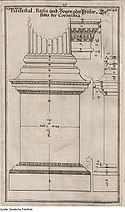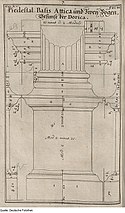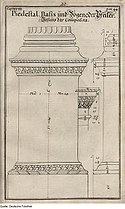pedestal

The pedestal , also the pedestal ( Middle French . Piédestal , Italian. Piedestallo , to Italian. Piede “foot” and stallo “seat”) is a sometimes quite elaborately designed substructure or base of buildings, columns or sculptures such as sculptures and statues . In the 19th century, the term basament , which is related to the pedestal, was used in Italian, but could also stand for foundation wall , substructure or ground floor .
If a pedestal is just a simple, low base plate, this is called a plinth . Small pedestals or pedestals, for example on the gables of buildings for vases or statues, are also referred to as "picture chair" or "picture chair". Typical base elements are the " cornice ", the "pedestal shaft " and the "cornice".
Inscriptions
Pedestals of memorials and monuments often contain an inscription or an inscription plaque on the people involved or represented in the erection, the context of events and other data.
Examples
The Roman Emperor Trajan had his successes in the Dacer Wars depicted on the statue known as the Trajan Column in Rome . The pedestal had various tasks: First it represents the entrance to the column that can be walked on, then it was designed as a storage place for the emperor's urn and finally it functions as a bearer of the dedicatory inscription.
The equestrian statue of Frederick the Great by Christian Daniel Rauch from 1851 in Berlin also has an artistically and structurally complex base construction.
- Column pedestal in an architectural treatise
literature
- Johann Georg Sulzer; General theory of fine arts , 1771, pedestal (digital edition for full-text research in the digital library series as volume 67, ISBN 3-89853-467-7 )
- Heinrich Sebald: The monument of Frederick the Great. A detailed description of the monument, along with 31 short biographies relating to the people depicted on the central pedestal. With an illustration of the monument, Berlin: Logier, 1851.



